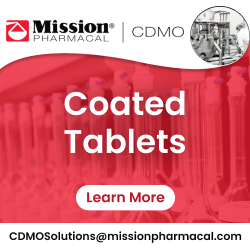By PharmaCompass
2024-12-19
Impressions: 2886
The contract development and manufacturing organization (CDMO) space continued to grow at an impressive pace in the second half (H2) of 2024, with significant progress being made across cell and gene therapies (CGTs), antibody-drug conjugates (ADCs), novel drug modalities, and digital solutions.
Some of the key players in the CDMO space include Lonza, EUROAPI, Evonik, SEQENS, Fujifilm Diosynth Biotechnologies, Quotient Sciences, Axplora, PolPharma, and Famar from Europe; Mission CDMO, LGM Pharma, Veranova, and Thermo Fisher from the US; and Samsung Biologics, Bora Pharmaceuticals, and Porton Pharma Solutions from Asia. Texas-based Mission CDMO has been in the pharma industry for over 75 years. Today, it is known for its comprehensive contract services and high-quality manufacturing capabilities that have reinforced its position as a trusted partner.
View CDMO Activity Tracker for H2 2024 (Free Excel Available)
Bora, PolPharma drive CDMO acquisitions; Samsung Biologics clocks over US$ 4 bn in contract value
The second half of 2024 saw several high-value acquisitions and expansions that reshaped the CDMO landscape. South Korea-based Samsung Biologics clocked a cumulative contract value of over US$ 4 billion. It signed its largest manufacturing deal with an Asia-based pharmaceutical company, valued at US$ 1.24 billion. It also announced a series of manufacturing deals with a European drugmaker worth over US$ 668 million. Samsung Biologics is also building a dedicated ADC facility that is likely to be complete soon.
Taiwan’s largest CDMO, Bora Pharmaceuticals, announced its second acquisition of the year. It bought New Jersey-based Pyros Pharmaceuticals, a developer of rare disease treatments. Pyros recently launched Vigafyde, the only ready-to-use vigabatrin oral solution and the first new product approved to treat infantile spasms in 15 years. Bora also announced a strategic investment in Tanvex Biopharma, thereby creating a global platform for biologics development and supply.
PolPharma acquired Ziołolek, a renowned manufacturer of dermatological products, medical devices, and OTC medicines, thereby expanding its product portfolio. It also launched a state-of-the-art HPAPI (highly potent active pharmaceutical ingredients) facility in Poland, which is being seen as another step towards securing Europe’s drug supply chain.
In other developments, Avid Bioservices got acquired by funds managed by Ampersand and British healthcare investment firm GHO Capital Partners in an all-cash deal worth US$ 1.1 billion. And Agilent Technologies agreed to acquire Canadian specialty CDMO Biovectra for US$ 925 million, thereby enhancing its capabilities in gene-editing technologies and sterile fill-finish services.
View CDMO Activity Tracker for H2 2024 (Free Excel Available)
Evonik, EUROAPI, Porton Pharma, GSK announce tieups, technological expansions
Several CDMOs announced new collaborations and acquired new capabilities to enhance their service offerings. Evonik expanded its formulation capabilities for lipid nanoparticles used for mRNA and gene therapies through a collaboration with KNAUER Wissenschaftliche Geräte. This partnership aims to expand Evonik’s portfolio of biosolutions.
Evonik is also restructuring its keto and pharma amino acid business to focus on strategic core growth areas. Evonik launched Eudracap colon functional capsules for targeted delivery of oral drugs. These ready-to-fill capsules are designed to release their contents specifically in the colon, improving the efficacy of treatments for various gastrointestinal conditions. Evonik also opened a new facility for drying aqueous dispersions of Eudragit polymers in Darmstadt, Germany. This facility will enhance Evonik’s capabilities in producing high-quality polymers for pharmaceutical applications.
EUROAPI launched a new AI-powered Electronic Batch Record solution in collaboration with Aizon to enhance manufacturing productivity. This collaboration aims to digitize operations towards more data-driven manufacturing, focusing on small-scale productions and highly flexible plants.
Porton Pharma Solutions has expanded its reach through several strategic initiatives. In October, Porton entered into a partnership with Shanghai InnoStar to enhance its service offerings beyond small molecules, targeting peptides, oligonucleotide drugs, conjugated drugs, and advanced therapies. It continued to grow its capabilities by enhancing its GMP manufacturing capacity in Fengxian, Shanghai (China). The facility’s expansion is aimed at increasing the production of novel therapies, including peptides and oligonucleotide drugs. These moves are part of Porton’s broader strategy to position itself at the forefront of advanced pharmaceutical manufacturing.
Corden Pharma is investing € 900 million (US$ 985 million) over the next three years to expand its peptide platform facilities in Colorado (US) and Europe. While the US site will help meet the rising demand for GLP-1 peptides, in Europe, CordenPharma will construct a greenfield facility for small to large-scale peptide development and manufacturing.
CDMO Touchlight signed a licensing agreement with GSK that grants the drug behemoth non-exclusive rights to use Touchlight’s proprietary enzymatic doggybone DNA (dbDNA) technology for the development and production of mRNA-based products, particularly vaccines. Curia also integrated enzymatic dbDNA solutions through a collaboration with Touchlight, enhancing mRNA production for vaccine and cancer therapies.
View CDMO Activity Tracker for H2 2024 (Free Excel Available)
Lonza, Merck, Dr. Reddy’s owned Aurigene invest in cell and gene therapies
The CGT space continued to draw both deals and investments. Lonza and Vertex signed a long-term commercial supply agreement for Casgevy, the world’s first CRISPR/Cas9 gene-edited cell therapy, to treat sickle cell disease and beta thalassemia. This agreement includes manufacturing at Lonza’s Geleen (the Netherlands) cell therapy manufacturing facility, with plans to expand to Portsmouth, New Hampshire (US).
Miltenyi Biotec began manufacturing lentiviral vectors for Adaptimmune’s Tecelra, the first engineered TCR T-cell therapy for the rare soft tissue cancer synovial sarcoma approved by the US Food and Drug Administration.
Merck KGaA commenced commercial production at its first GMP-compliant manufacturing line for cell culture media (CCM) in China. This facility addresses the growing local demand for quality custom CCM used in biopharmaceuticals, vaccines, and novel therapeutics.
Aurigene and Edity Therapeutics announced a strategic collaboration in cell therapy, with Aurigene providing cell therapy discovery services to support Edity’s clinical development. Additionally, Aurigene and its parent, Dr. Reddy’s Laboratories, signed a memorandum of understanding (MoU) with Kainomyx for the development and commercialization of an affordable anti-malarial drug.
ProBio and UCI Therapeutics signed an MoU for a comprehensive collaboration in gene delivery technologies, including viral and non-viral approaches. Additionally, Korea’s VaxCell-Bio partnered with ProBio to accelerate the development of its chimeric antigen receptor (CAR)-related therapies.
The ADC market continued to be a hotbed of innovation and strategic expansion. Merck KGaA invested € 70 million (US$ 75 million) to triple its ADC manufacturing capacity at its Missouri (US) facility, aiming to support the rising demand for oncology therapies.
Sterling Pharma entered into a partnership with GlycoNex to support the clinical trials of their ADCs that target solid tumors. And, NJ Bio and Charles River Laboratories also announced a collaboration to optimize ADC manufacturing.
The adeno-associated viral (AAV) vector field also saw activity with Rentschler Biopharma and Forge Biologics announcing the launch of a new service offering and a manufacturing platform, respectively. Similarly, Andelyn Biosciences was selected by Hubble Therapeutics to manufacture clinical grade AAV.
Meanwhile, Lonza has gone in for a restructuring exercise in order to become a “pure-play CDMO”. It has exited its capsules and health ingredients business, and adopted a new organizational structure. The Swiss CDMO has also extended a collaboration with a major global biopharmaceutical partner for commercial-scale manufacture of ADCs.
View CDMO Activity Tracker for H2 2024 (Free Excel Available)
Our view
As pharmaceutical development becomes increasingly complex, CDMOs are no longer just manufacturing partners, but critical innovation hubs. Little wonder then that 2024’s biggest pharma deal was in the CDMO space – Novo Holdings’ US$ 16.5 billion buyout of Catalent. This trend should gather momentum. We expect more M&A activity in this space in 2025.
The PharmaCompass Newsletter – Sign Up, Stay Ahead
Feedback, help us to improve. Click here
Image Credit : CDMO Activity Tracker for H2 2024 by PharmaCompass license under CC BY 2.0
“ The article is based on the information available in public and which the author believes to be true. The author is not disseminating any information, which the author believes or knows, is confidential or in conflict with the privacy of any person. The views expressed or information supplied through this article is mere opinion and observation of the author. The author does not intend to defame, insult or, cause loss or damage to anyone, in any manner, through this article.”






